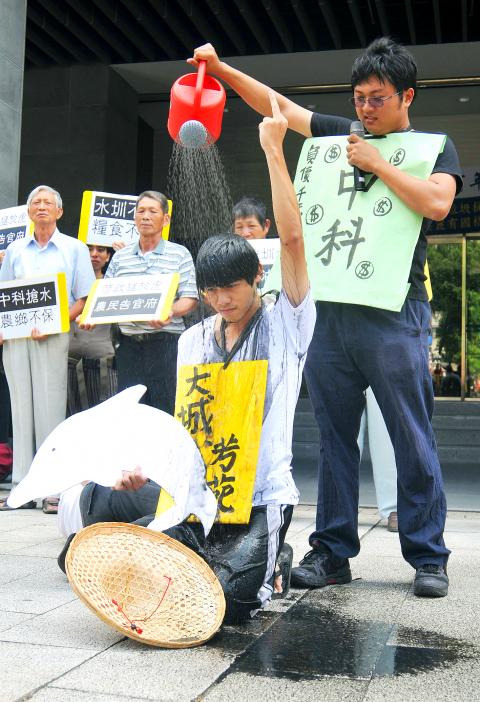By Lee I-chia
Staff Reporter
Farmers, fishermen and environmentalists yesterday staged a protest in front of the Environmental Protection Administration (EPA) building in Taipei, urging Environmental Impact Assessment Committee (EIAC) members to put a stop to the fourth-phase expansion project at the Central Taiwan Science Park (CTSP).

Photo: CNA
The protesters said the EPA has neglected local people’s opposition to the project by conditionally passing the science park’s environmental impact assessment in 2009, thus leaving many environmental problems unsolved.
Among the problems, the protesters said, is the issue of where and how industrial wastewater from the science park would be discharged, adding that this was the first project to gain approval from the EIAC when the wastewater discharge plans weren’t even confirmed.
Youth Alliance of Anti-CTSP member Lin Ming-hua (林明樺) said the utility rates of existing science parks across the country are still low and it has been evaluated that they would not be able to reclaim their construction costs any time soon because of privileged discounted rent and tax waiver policies.
“Why develop just for the sake of development when it brings no substantial benefit to the people?” she asked.
Shih-hsin University Department of Public Policy and Management assistant professor Tu Wen-ling (杜文苓) said there are up to 60,000 chemical substances contained in merchandise on the market, and the government already has difficulties examining them. The government should demand the manufacturers announce what chemicals are included in the waste water, he said.
Lin Lien-tsung (林連宗), secretary-general of the Fangyuan Self-Help Association in Changhua County, added that the Changhua and Yunlin areas are already facing problems of land subsidence and insufficient farm irrigation water, so where the CTSP fourth-phase expansion project would get its water supply from is already an unsolved problem.
The protesters urged for the project to be reconsidered in its entirety, since it raised so many concerns and issues waiting to be solved.
A EIAC meeting was held yesterday afternoon to review an analysis report submitted by the developer on a different approach to the waste water disposal problem.
Instead of the initial plan of discharging waste water into the Jhuoshuei River (濁水溪), the developer — the National Science Council’s CTSP Administration — proposed new plans of constructing a 34.5km long pipe (with more than 5km going into the ocean) to discharge waste water into the sea. The CTSP Administration representative said it would have less of an environmental impact than discharging the wastewater into the river.
After more than two hours of discussion, the committee concluded that the CTSP Administration should submit a revised report for further review by adding supplement information on aspects such as the waste water discharge pipe’s security management and emergency response methods, geological data along the pipeline and environmental impacts on the rivermouth.

ANOTHER EMERGES: The CWA yesterday said this year’s fourth storm of the typhoon season had formed in the South China Sea, but was not expected to affect Taiwan Tropical Storm Gaemi has intensified slightly as it heads toward Taiwan, where it is expected to affect the country in the coming days, the Central Weather Administration (CWA) said yesterday. As of 8am yesterday, the 120km-radius storm was 800km southeast of Oluanpi (鵝鑾鼻), Taiwan’s southernmost tip, moving at 9kph northwest, the agency said. A sea warning for Gaemi could be issued tonight at the earliest, it said, adding that the storm is projected to be closest to Taiwan on Wednesday or Thursday. Gaemi’s potential effect on Taiwan remains unclear, as that would depend on its direction, radius and intensity, forecasters said. Former Weather Forecast

As COVID-19 cases in Japan have been increasing for 10 consecutive weeks, people should get vaccinated before visiting the nation, the Centers for Disease Control (CDC) said. The centers reported 773 hospitalizations and 124 deaths related to COVID-19 in Taiwan last week. CDC Epidemic Intelligence Center Director Guo Hung-wei (郭宏偉) on Tuesday said the number of weekly COVID-19 cases reported in Japan has been increasing since mid-May and surpassed 55,000 cases from July 8 to July 14. The average number of COVID-19 patients at Japan’s healthcare facilities that week was also 1.39 times that of the week before and KP.3 is the dominant

The Chinese Communist Party’s (CCP) working group for Taiwan-related policies is likely to be upgraded to a committee-level body, a report commissioned by the Mainland Affairs Council (MAC) said. As Chinese President Xi Jinping (習近平) is increasingly likely to upgrade the CCP’s Central Leading Group for Taiwan Affairs, Taiwanese authorities should prepare by researching Xi and the CCP, the report said. At the third plenary session of the 20th Central Committee of the CCP, which ended on Thursday last week, the party set a target of 2029 for the completion of some tasks, meaning that Xi is likely preparing to

US-CHINA TRADE DISPUTE: Despite Beijing’s offer of preferential treatment, the lure of China has dimmed as Taiwanese and international investors move out Japan and the US have become the favored destinations for Taiwanese graduates as China’s attraction has waned over the years, the Ministry of Labor said. According to the ministry’s latest income and employment advisory published this month, 3,215 Taiwanese university graduates from the class of 2020 went to Japan, surpassing for the first time the 2,881 graduates who went to China. A total of 2,300 graduates from the class of 2021 went to the US, compared with the 2,262 who went to China, the document showed. The trend continued for the class of 2023, of whom 1,460 went to Japan, 1,334 went to